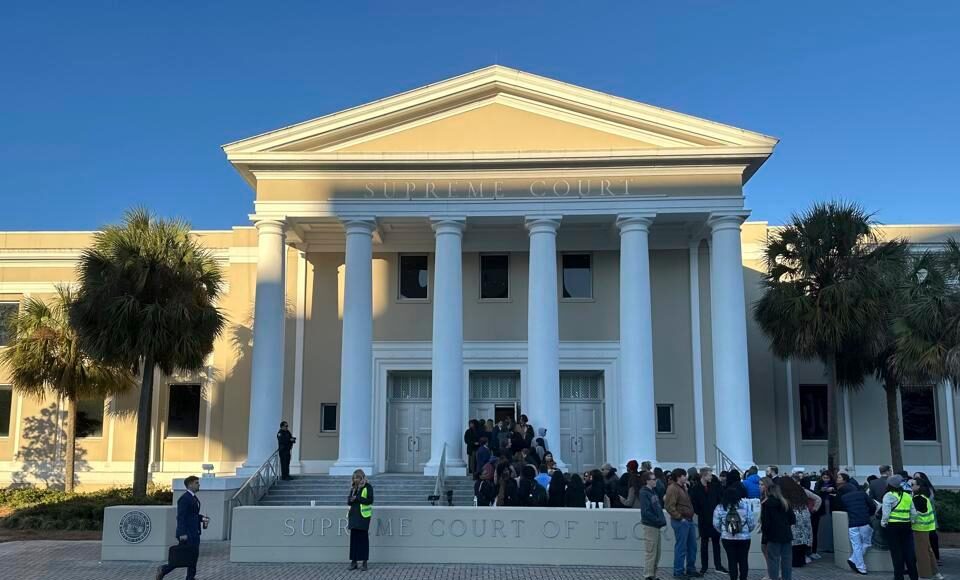The Florida Supreme Court heard oral arguments Wednesday on a ballot measure that would enshrine the right to an abortion in the state constitution—if the court says it can appear on the Florida ballot come November—marking the latest hurdle for one of a handful of states attempting to put state-wide abortion protections in place using ballot measures in the wake of the Supreme Court overturning Roe v. Wade.
Nathan Forrester, senior deputy solicitor general for Florida, argued in court Wednesday that the amendment’s language is ambiguous and could have multiple interpretations, according to the Washington Post.
The argument did not appear to persuade Chief Justice Carlos Muniz, who said the amendment was a “pretty aggressive, comprehensive approach to dealing with this issue,” and noted that the people of Florida aren’t “stupid” and “can figure this out,” the Post reported.
Courtney Brewer, a lawyer for Floridians Protecting Freedom told reporters after the hearing that the language in the amendment is “clear and unambiguous” and said Florida voters will be able to understand it, despite the state’s argument otherwise.
The question of whether the amendment can appear on the state ballot was brought to the state’s Supreme Court by the Attorney General Ashley Moody who—after abortion advocates received the required signatures needed for the question to appear on the ballot—challenged the language of the question.
It’s unclear exactly when the Florida Supreme Court will make their final ruling.
The proposal asks for a state constitutional amendment that would bar restrictions on abortion before fetal viability or when abortions are necessary “to protect the patient’s health, as determined by the patient’s healthcare provider.” Moody has argued that some terms in the initiative are not properly defined and that there are differing opinions on the definition of “viability.” Advocates in the state have gotten nearly one million signatures, surpassing the required 892,000 needed to appear on the ballot, according to the Florida Division of Elections.
60%. That’s the percentage of Florida voters who would have to support the proposed amendment in November in order for the effort to succeed.
Florida has a 15-week ban on abortion currently in place, but that ban is being challenged in the Supreme Court by abortion advocates who claim it violates the state’s constitution. If the Supreme Court—made up of seven justices, five of whom were appointed by Gov. Ron DeSantis (R)—sides with DeSantis and allows the ban on abortion to stand, a separate six-week ban that was signed into law in April by DeSantis will go into effect. Florida is not the only state trapped in this limbo in the post-Roe era where conservative governors and legislatures are working to restrict abortion access and advocates for abortion access are trying to enshrine the right at the state level. In an attempt to stop or even prevent the efforts getting stuck in the courts, advocates in many states have been working to bring the question of abortion access directly to voters using ballot initiatives. Some states have already been successful in that approach, like Ohio, where voters passed a ballot measure to protect abortion in the Republican-led state. A ballot effort in August 2022 led abortion rights in Kansas to be protected. And voters in Michigan, California and Vermont voted to protect abortion rights through ballot measures in November 2022.
Arizona, Arkansas, Nebraska, Nevada and South Dakota are all in the signature phase of attempting to get some variation of abortion protections guaranteed through a ballot question in the upcoming election.
Voters in Maryland will see a ballot question that asks if they want to enshrine the right for women to end their pregnancies in the state’s constitution—currently abortion is allowed until viability in the state. New Yorkers will also see a question on their 2024 ballot about abortion that will ask voters if they want to amend the constitution to prohibit the denial of rights to an individual based on their “pregnancy, pregnancy outcomes, and reproductive health care and autonomy.”
Colorado currently has no term restrictions on abortion, but two competing initiatives are fighting for ballot access: One would amend the state constitution to protect abortion and require insurance plans to cover it, and the other would prohibit abortion altogether. Meanwhile, some reproductive groups in Missouri– where abortion is illegal except in cases of medical emergencies—are pushing for a ballot measure that would make abortion legal until viability, while another measure would allow abortion up to 12 weeks with some exceptions.
Florida Abortion Access Proposal Receives Enough Signatures To Appear On 2024 Ballot (Forbes)









